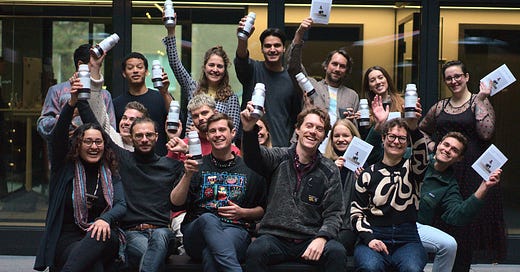AI research takes the prize
A handful of top researchers got the recognition they deserve with the recent Nobel Prizes. Here's why that makes me excited as an AI investor.
When news broke this week that John Hopfield and Geoffrey Hinton, two machine learning pioneers, won the Nobel Prize in Physics, it felt like a profound moment of recognition for AI.
Simplifying things greatly, Hinton is widely regarded as the “godfather of AI,” and his work on neural networks and deep learning are fundamental to the field, particularly on “backpropagation” which influenced how models make predictions based on inputs. Hopfield similarly offered the core of the foundation of modern machine learning, including innovations in pattern recognition.
Their work, which came decades ago, paved the way for more modern and advanced breakthroughs we’ve seen in recent years, many of which I’ve written about on this Substack.
When a reporter called me for my thoughts, I said that the award would likely be the first of many Nobel Prizes offered for research in AI. I figured that we’d eventually see Nobels for sector breakthroughs, such as a new AI innovation in healthcare that saves millions of lives.
Well, it turned out that we only had to wait one more day for another such recognition. On Wednesday, Demis Hassabis and John Jumper of DeepMind and David Baker, a computational biologist, won the chemistry Nobel Prize prize for their work on protein structures.
Their breakthroughs are extremely important for the future of health and medicine, especially in the development of drug discovery, and can help speed up processes in the pharmaceutical industry and reduce costs. A big credit to Google as well for its support of AI research through DeepMind and other initiatives, showing how scientific research and commercial developments can go hand in hand to create truly innovative AI tools that can reach the market quickly and have an immediate, tangible impact.
I really believe in this future, which is why I think these prizes offer a signal of AI’s full arrival and the power this technology on the application layer across industries like healthcare and techbio, where we see true value. At Merantix Capital, we recently invested in Graph Therapeutics, for instance, which uses AI-driven precision medicine in a lab-in-the-loop discovery engine in order to tackle immune-driven diseases.
Or take our venture Cambrium, which designs molecules at the amino-acid level, achieving micro-molecular precision. Cambrium’s first product is a sustainable collagen, but as founder Mitchell Duffy told TechCrunch, the sky is really the limit when it comes to future materials. You can imagine how this technology could change textiles, industrial materials, and much more — driving down cost but, most importantly, doing so sustainably.
It’s easy to get caught up in AI hype, boardroom dramas, or science fiction, and forget the potential impact of this technology: making our lives and our planet better. I think we’ll see a lot of other “AI Nobel Prizes” given to interdisciplinary researchers in many other sectors.




